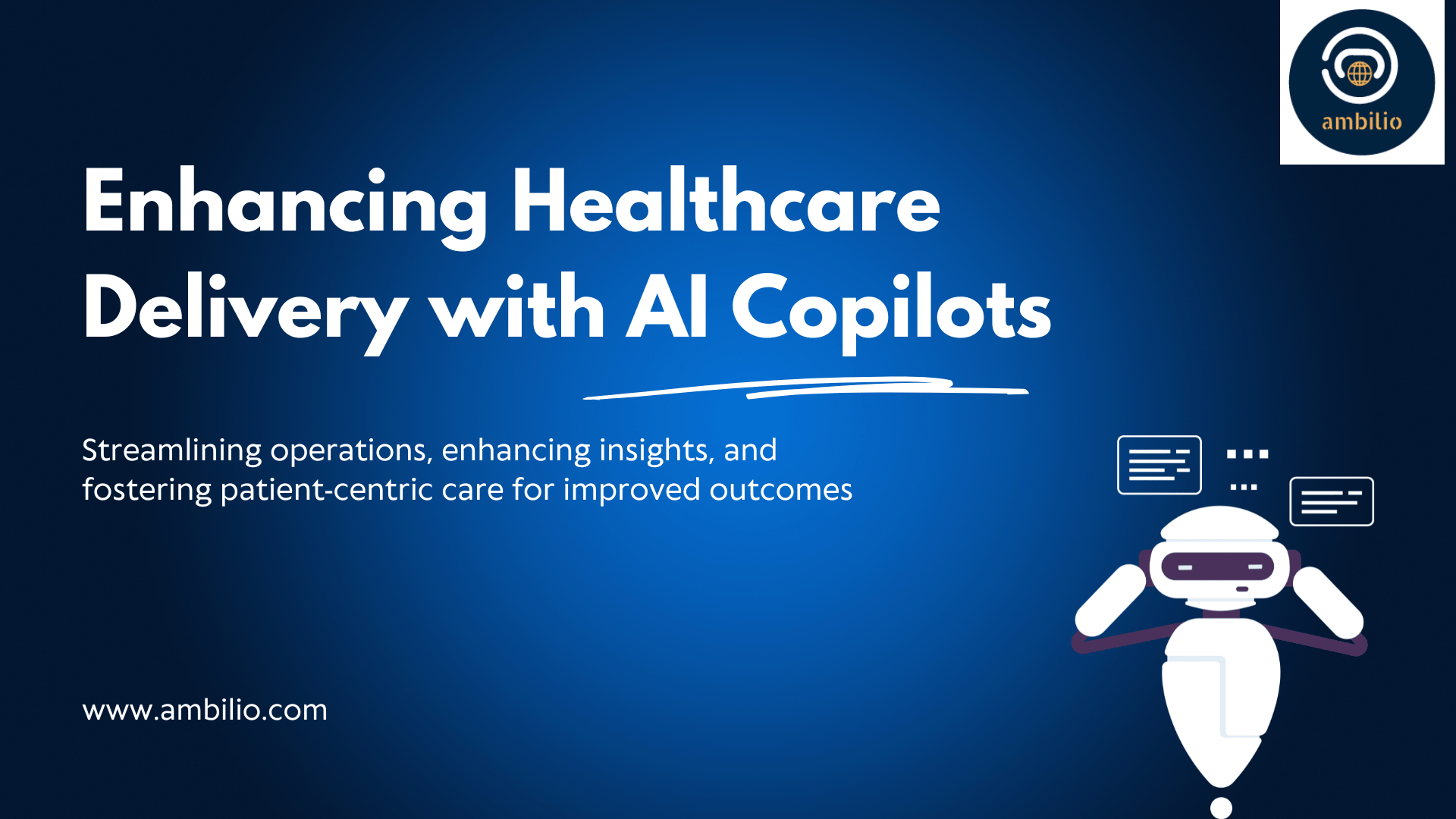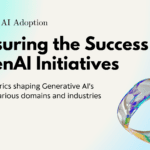In the dynamic landscape of healthcare, where patient outcomes are paramount, leveraging advanced technologies is crucial for enhancing efficiency, efficacy, and overall quality of care. Customer-facing teams, including healthcare marketers, field representatives, and analysts, play a pivotal role in ensuring seamless communication, optimal service delivery, and patient satisfaction. However, the sheer volume and complexity of healthcare data often overwhelm these teams, hindering their ability to extract actionable insights and deliver personalized care effectively.
To address these challenges and maximize the potential of customer-facing teams in the healthcare domain, organizations are increasingly turning to AI-powered copilots. These intelligent tools harness the power of artificial intelligence to assist teams in data retrieval, summarization, insight synthesis, campaign optimization, and enhancing patient interactions. By automating routine tasks and providing real-time insights, AI copilots empower healthcare professionals to make informed decisions, optimize workflows, and ultimately, improve patient outcomes.
Data Insights On-Demand
One of the key applications of AI copilots in healthcare is data retrieval. These tools are adept at accessing and analyzing vast repositories of healthcare data, including electronic health records (EHRs), medical literature, patient feedback, and clinical trial data. By aggregating and synthesizing this information, AI copilots enable healthcare teams to stay abreast of the latest medical advancements, treatment protocols, and patient preferences. This real-time access to relevant data enhances clinical decision-making, facilitates evidence-based practice, and fosters continuous improvement in patient care.
Expected ROI: By streamlining the data retrieval process and providing timely insights, AI copilots can significantly increase the productivity of customer-facing teams in healthcare. This leads to improved resource utilization, reduced administrative burden, and enhanced collaboration among healthcare professionals. Ultimately, it translates into better patient outcomes, higher patient satisfaction scores, and improved organizational performance.
Integrating AI copilots for data retrieval can streamline healthcare professionals’ workflow, saving approximately 10 hours per week. Considering the average hourly wage of healthcare professionals at $30, this translates to an annual savings of around $15,600.
Streamlined Content Summarization
In the complex landscape of healthcare, where information overload is commonplace, AI copilots play a crucial role in summarizing and distilling large volumes of medical literature, research papers, and clinical guidelines into concise, digestible insights. By automating the summarization process, these tools save valuable time for healthcare analysts and marketers, allowing them to focus on strategic initiatives and patient-centric activities. Whether it’s summarizing the latest clinical trials on a specific medical condition or extracting key insights from patient satisfaction surveys, AI copilots empower healthcare teams to extract actionable intelligence quickly and efficiently.
Expected ROI: By automating the summarization process, AI copilots reduce the time and effort required to sift through voluminous healthcare data. This improves the efficiency of customer-facing teams, enabling them to stay updated on the latest medical advancements and regulatory changes. Moreover, by providing concise summaries of relevant information, AI copilots facilitate better communication and collaboration among healthcare professionals, leading to more informed decision-making and improved patient care.
AI copilots designed for summarization can significantly reduce the time spent on analyzing medical literature, saving about 5 hours per week. With an average hourly wage of $30, this results in annual savings of approximately $7,800.
Comprehensive Insight Synthesis
AI copilots excel in synthesizing diverse datasets and identifying patterns, correlations, and insights that may not be immediately apparent to human analysts. In the healthcare domain, where data heterogeneity is prevalent, these tools play a vital role in uncovering hidden trends, patient preferences, and clinical best practices. Whether it’s analyzing patient demographics to identify high-risk populations or correlating treatment outcomes with patient characteristics, AI copilots empower healthcare teams to gain deeper insights into patient care delivery, resource allocation, and population health management.
Expected ROI: By leveraging AI copilots for insight synthesis, healthcare organizations can unlock valuable insights from their data assets, driving strategic decision-making and performance improvement initiatives. Whether it’s identifying opportunities for cost savings, optimizing clinical workflows, or tailoring interventions for specific patient cohorts, AI copilots enable healthcare teams to make data-driven decisions that enhance efficiency, quality, and patient satisfaction.
By enhancing insights synthesis by 15%, AI copilots can contribute to cost savings. Estimating a conservative 5% reduction in expenses related to insights synthesis, this translates to an expected ROI of $5,000 annually.
Targeted Campaign Optimization
Effective communication and engagement are essential for building trust and fostering long-term relationships with patients and caregivers. AI copilots play a crucial role in optimizing healthcare marketing campaigns by providing actionable insights into patient preferences, behavior patterns, and communication channels. Whether it’s optimizing digital advertising strategies based on demographic data or tailoring educational content to specific patient segments, AI copilots enable healthcare marketers to deliver targeted, personalized messages that resonate with their audience.
Expected ROI: By leveraging AI copilots for campaign optimization, healthcare organizations can maximize the effectiveness of their marketing efforts while minimizing costs and resource wastage. Whether it’s improving patient engagement rates, increasing appointment adherence, or driving patient loyalty, AI copilots empower healthcare marketers to achieve measurable outcomes that contribute to organizational growth and sustainability.
AI copilots can enhance campaign effectiveness, increasing conversion rates by 5%. Assuming an annual marketing budget of $50,000, this would yield additional revenue of $2,500.
Enhanced Patient Interactions
In the era of patient-centered care, personalized interactions are paramount for delivering exceptional patient experiences and fostering patient loyalty. AI copilots enhance patient interactions by providing healthcare professionals with real-time insights into patient preferences, medical history, and treatment options. Whether it’s recommending personalized treatment plans based on clinical guidelines or addressing patient inquiries through virtual assistants, AI copilots empower healthcare teams to deliver tailored, patient-centric care that meets the unique needs of each individual.
Expected ROI: By facilitating personalized patient interactions, AI copilots contribute to improved patient satisfaction, loyalty, and retention. Whether it’s reducing wait times, improving communication between patients and caregivers, or enhancing the overall patient experience, AI copilots enable healthcare organizations to differentiate themselves in a competitive market while driving positive patient outcomes and brand loyalty.
Implementing AI copilots to improve patient interactions could lead to a 10% increase in patient satisfaction and subsequent retention. Assuming an average revenue per patient of $5,000 annually, this would result in additional revenue of $500 per patient.
Final Words
AI copilots represent a transformative technology that has the potential to revolutionize healthcare delivery by empowering customer-facing teams with actionable insights, streamlined workflows, and enhanced patient interactions. By leveraging AI copilots for data retrieval, summarization, insight synthesis, campaign optimization, and patient engagement, healthcare organizations can drive tangible improvements in efficiency, effectiveness, and patient outcomes. As the healthcare industry continues to evolve, embracing AI copilots will be essential for staying ahead of the curve and delivering high-quality, patient-centered care in an increasingly complex and competitive landscape.



